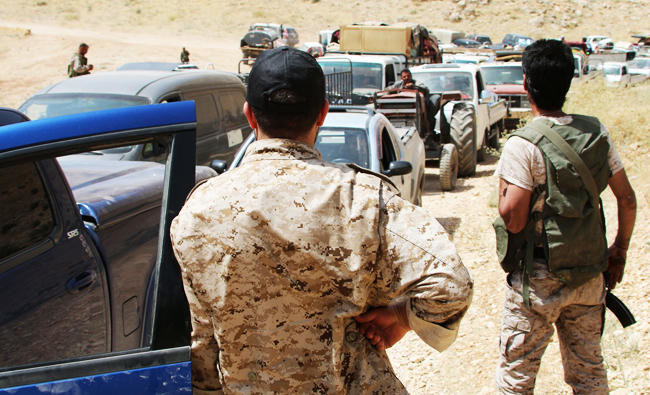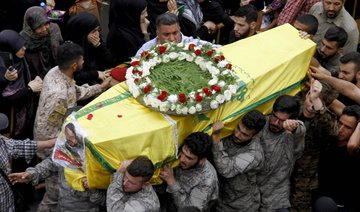BEIRUT: Hezbollah’s attacks on Jabhat Fateh Al-Sham (JFS) militants have continued in Arsal on the Syrian-Lebanese border for a fifth day, with leading Lebanese parties refusing to provide it with political cover.
The Future Movement, led by Prime Minister Saad Al-Hariri, confirmed in a statement his party’s “commitment to the Lebanese army, which is the legitimate security force and the only one that is entrusted with defending Lebanon and the Lebanese people and protecting the country’s borders.”
The statement said: “If Hezbollah’s approach of incitement and treason during the ongoing battles in the eastern mountain ranges is aimed at legitimizing its participation in the Syrian war, and other ongoing wars in Lebanon and abroad, we will not be party to this national sin, regardless of the threats… against those opposing the policies of Hezbollah.”
Al-Hariri’s party said terrorism is a threat to Lebanon and the Arab and Islamic worlds, and “must be uprooted.”
But it added that fighting terrorism should not be used as a pretext “to trample upon the state and its constitutional institutions to participate in Arab civil wars, interfere in the internal affairs of Arab states or organize cells that threaten their peace and security.”
The Lebanese Forces party, in a statement by Social Affairs Minister Pierre Bou Assi, also rejected Hezbollah’s actions in Arsal, saying: “We only care about decisions taken by the Lebanese government and implemented by the legitimate security institutions.”
The Kataeb Party affirmed “the role of the Lebanese army in combatting terrorism and preserving Lebanon’s sovereignty, security, stability and in protecting its borders.”
President Michel Aoun was briefed by army commander Gen. Joseph Aoun and top security officials on security developments in Arsal.
In a statement, the president praised the “preparedness of the army to repel any attack on Lebanese territories and protect the residents and the displaced people.”
Hezbollah said it is making progress in areas controlled by JFS, while areas controlled by Daesh have not yet witnessed clashes.
Hezbollah said it is in “full control” of Wadi Al-Khail, which it described as “the bastion” JFS. Hezbollah reported “a state of collapse and chaos” among JFS ranks.
Hezbollah urged all militants in Arsal “to hand themselves over with a guarantee of their safety and protection, as the battle appears to be on the verge of ending.”
Lebanese PM declares Hezbollah battles in Arsal illegitimate
Lebanese PM declares Hezbollah battles in Arsal illegitimate

US says it is aware of Palestinian American’s killing by Israeli forces in West Bank

- Israel has expanded and consolidated settlements in the occupied West Bank as part of the steady integration of these territories into the state of Israel in breach of international law, the UN human rights office said last month
WASHINGTON: The US State Department said on Tuesday it was aware of the killing by Israeli forces of a Palestinian American teenager in the Israeli-occupied West Bank and was seeking more information about the incident.
A State Department spokesperson made the comments to reporters when asked about the killing of US citizen Omar Mohammad Rabea, 14, and the shooting of two other teenagers.
“We are certainly aware of that dynamic,” the State Department spokesperson said. “There is an investigation that is going on. We are aware of the reports from the IDF that this was a counterterrorism act, we need to learn more about the nature of what happened on the ground.”
The Palestinian foreign ministry condemned the weekend incident as an “extra-judicial killing” by Israeli forces during a raid. A local mayor said Rabea was shot along with two other teenagers by an Israeli settler and that the Israeli army pronounced him dead after detaining him.
The Israeli military said it shot a “terrorist” who endangered civilians by hurling rocks.
“We don’t have the complete picture of what was going on on the ground,” the State Department spokesperson added.
Israel has expanded and consolidated settlements in the occupied West Bank as part of the steady integration of these territories into the state of Israel in breach of international law, the UN human rights office said last month.
Settler violence in the West Bank, including incursions into occupied territory and raids, has intensified since the start of Israel’s war in Gaza that has killed over 50,000, according to Gaza’s health ministry, and led to genocide and war crimes accusations that Israel denies.
The Israeli onslaught in Gaza followed a Hamas attack in October 2023 in which 1,200 were killed and about 250 taken hostage, according to Israeli tallies.
Israel troops shoot dead woman in alleged West Bank knife attack

- Yaqub was a lawyer and mother of three from nearby Biddya, the village’s mayor, Ahmed Abu Safiyeh, told AFP
- The Israeli military said Tuesday that Israeli settlers set fire to a Palestinian event hall overnight in the area of Biddya, and that no injuries were reported
HARES, Palestinian Territories: The Palestinian health ministry said Israeli troops killed a 30-year-old woman near the West Bank city of Salfit on Tuesday after what the army described as an attempted stabbing.
The ministry reported the death of Amana Ibrahim Mohammed Yaqub, 30, “who was shot by (Israeli) forces near Salfit,” south of Nablus.
The Israeli military said it had “neutralized a terrorist who hurled rocks and attempted to stab soldiers adjacent to the Gitai Avisar junction” close to the West Bank village of Hares.
An AFP journalist reported seeing a lifeless body under a foil blanket by the roadside at the scene of the attack.
Yaqub was a lawyer and mother of three from nearby Biddya, the village’s mayor, Ahmed Abu Safiyeh, told AFP.
The Israeli military said Tuesday that Israeli settlers set fire to a Palestinian event hall overnight in the area of Biddya, and that no injuries were reported.
An AFP journalist reported most of the hall was burned to the ground, and that settlers left graffiti in Hebrew on nearby walls.
The area around Salfit and Biddya is dense with Israeli settlements, including the town of Ariel.
Since the start of the Gaza war in October 2023, violence has soared in the occupied West Bank. Israeli troops and settlers have killed at least 918 Palestinians in the territory, according to health ministry figures.
Palestinian attacks and clashes during military raids have killed at least 33 Israelis, including soldiers, over the same period, according to Israeli figures.
Hamas official says ‘necessary to reach a ceasefire’ in Gaza

- “This war cannot continue indefinitely, and it is therefore necessary to reach a ceasefire,” Hossam Badran, a member of Hamas’s political bureau, told AFP
GAZA CITY, Palestinian Territories: A Hamas official told AFP on Tuesday that it was “necessary to reach a ceasefire” in the Gaza Strip, three weeks after Israel resumed bombardments on the Palestinian territory.
“This war cannot continue indefinitely, and it is therefore necessary to reach a ceasefire,” Hossam Badran, a member of Hamas’s political bureau, told AFP, adding that “communication with the mediators is still ongoing” but that “so far, there are no new proposals.”
Iran-backed militias in Iraq ‘ready to disarm’

- They fear threat of US airstrikes
BAGHDAD: Powerful Iran-backed militias in Iraq are ready to disarm to avert the threat of US airstrikes, they said on Tuesday.
The move follows repeated private warnings by US officials to the Iraqi government since Donald Trump took office as US president in January.
They told Baghdad that unless it acted to disband the militias on its soil, America could attack the groups.
“Trump is ready to take the war with us to worse levels, we know that, and we want to avoid such a bad scenario,” said one commander of Kata’ib Hezbollah, the most powerful militia.
BACKGROUND
Militia leaders said the Islamic Revolutionary Guard Corps had told them to do whatever they deemed necessary to avoid being drawn into a potentially ruinous conflict with the US.
The others that have offered to lay down their weapons are Nujabaa, Kata’ib Sayyed Al-Shuhada and Ansarullah Al-Awfiyaa.
Militia leaders said their main ally and patron, the Islamic Revolutionary Guard Corps in Iran, had told them to do whatever they deemed necessary to avoid being drawn into a potentially ruinous conflict with the US.
The militias are part of the Islamic Resistance in Iraq, about 10 armed factions with about 50,000 fighters and arsenals that include long-range missiles and anti-aircraft weapons.
They are a key pillar of Iran’s network of regional proxy forces, and have carried out dozens of missile and drone attacks on Israel and US forces in Iraq and Syria since the Gaza war began in 2023.
Iraqi security officials said Prime Minister Mohammed Shia’ Al-Sudani was pressing for disarmament by all militias that declared their allegiance to the Revolutionary Guards or its Quds Force rather than to Baghdad.
Some have already quit their bases and reduced their presence in major cities including Mosul and Anbar for fear of airstrikes.
Pro-Turkiye Syria groups reduce presence in Kurdish area

- Turkish forces and their Syrian proxies carried out an offensive from January to March 2018 targeting Kurdish fighters in the Afrin area
- Kurdish-led Syrian Democratic Forces (SDF) played a key role in the recapture of the last territory held by the Daesh group in Syria in 2019
DAMASCUS: Pro-Turkiye Syrian groups have scaled down their military presence in a historically Kurdish-majority area of the country’s north which they have controlled since 2018, a Syrian defense ministry official said on Tuesday.
The move follows an agreement signed last month between Syria’s new authorities and Kurdish officials that provides for the return of displaced Kurds, including tens of thousands who fled the Afrin region in 2018.
The pro-Ankara groups have “reduced their military presence and checkpoints” in Afrin, in Aleppo province, the official told AFP, requesting anonymity as they were not authorized to speak to the media.
Their presence has been “maintained in the region for now,” said the official, adding that authorities wanted to station them in army posts but these had been a regular target of Israeli strikes.
After Islamist-led forces ousted longtime ruler Bashar Assad in December, the new authorities announced the disbanding of all armed groups and their integration into the new army, a move that should include pro-Turkiye groups who control swathes of northern Syria.
Turkish forces and their Syrian proxies carried out an offensive from January to March 2018 targeting Kurdish fighters in the Afrin area.
The United Nations has estimated that half of the enclave’s 320,000 inhabitants fled during the offensive.
The Kurds and rights groups have accused the pro-Turkiye forces of human rights violations in the area.
Last month, the Kurdish semi-autonomous administration that controls swathes of northern and northeastern Syria struck a deal to integrate its civil and military institutions into those of the central government.
The administration’s de facto army, the Kurdish-led Syrian Democratic Forces (SDF), played a key role in the recapture of the last territory held by the Daesh group in Syria in 2019, with backing from a US-led international coalition.
A Kurdish source close to the matter said the people of Afrin were “waiting for all the checkpoints to be removed and for the exit of pro-Turkiye factions.”
Requesting anonymity as the issue is sensitive, the source told AFP that in talks with Damascus, the SDF was pushing for security personnel deployed in Afrin to be from the area.
The SDF is also calling for “international organizations or friendly countries from the international coalition” to supervise collective returns, the source added.
Syria’s new leadership has been seeking to unify the country since the December overthrow of longtime president Bashar Assad after more than 13 years of civil war.
This month, Kurdish fighters withdrew from two neighborhoods of Aleppo as part of the deal.
Syrian Kurdish official Bedran Kurd said on X that the Aleppo city agreement “represents the first phase of a broader plan aimed at ensuring the safe return of the people of Afrin.”




















